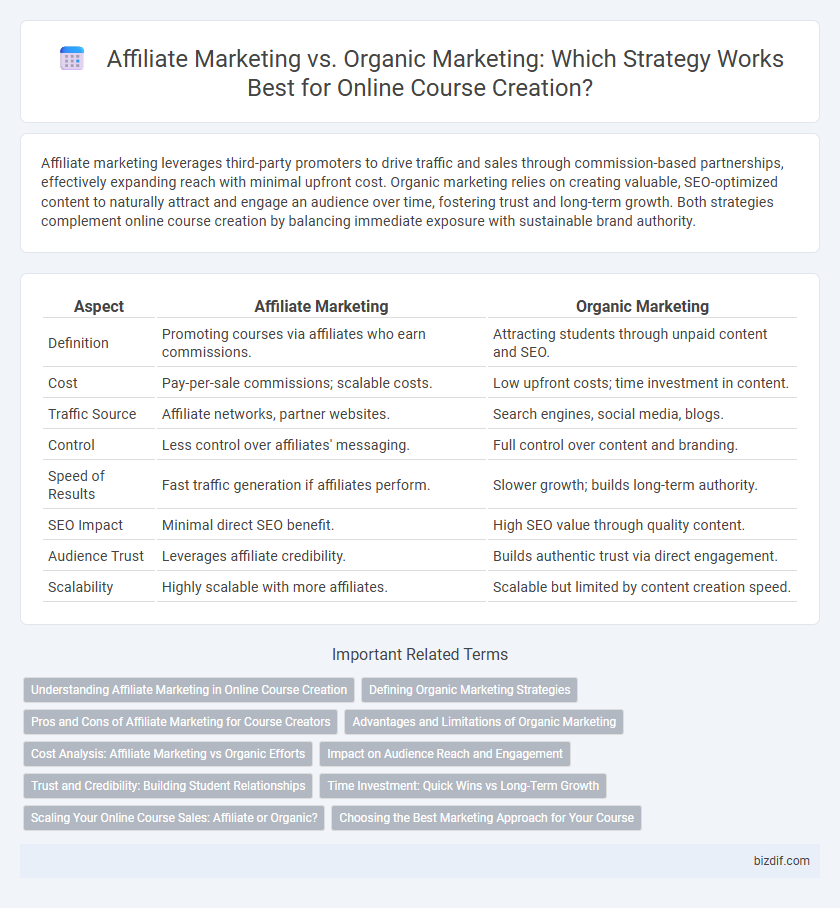Affiliate marketing leverages third-party promoters to drive traffic and sales through commission-based partnerships, effectively expanding reach with minimal upfront cost. Organic marketing relies on creating valuable, SEO-optimized content to naturally attract and engage an audience over time, fostering trust and long-term growth. Both strategies complement online course creation by balancing immediate exposure with sustainable brand authority.
Table of Comparison
| Aspect | Affiliate Marketing | Organic Marketing |
|---|---|---|
| Definition | Promoting courses via affiliates who earn commissions. | Attracting students through unpaid content and SEO. |
| Cost | Pay-per-sale commissions; scalable costs. | Low upfront costs; time investment in content. |
| Traffic Source | Affiliate networks, partner websites. | Search engines, social media, blogs. |
| Control | Less control over affiliates' messaging. | Full control over content and branding. |
| Speed of Results | Fast traffic generation if affiliates perform. | Slower growth; builds long-term authority. |
| SEO Impact | Minimal direct SEO benefit. | High SEO value through quality content. |
| Audience Trust | Leverages affiliate credibility. | Builds authentic trust via direct engagement. |
| Scalability | Highly scalable with more affiliates. | Scalable but limited by content creation speed. |
Understanding Affiliate Marketing in Online Course Creation
Affiliate marketing in online course creation leverages partnerships where affiliates promote courses in exchange for commissions, driving targeted traffic and increasing sales through performance-based incentives. This strategy offers scalability and cost-effectiveness since payment is made only for actual enrollments, maximizing marketing ROI. Understanding affiliate marketing enables course creators to expand reach efficiently by tapping into affiliates' established audiences and leveraging their promotional expertise.
Defining Organic Marketing Strategies
Organic marketing strategies in online course creation emphasize leveraging search engine optimization (SEO), content marketing, and social media engagement to attract a targeted audience without paid advertising. Tactics include publishing high-quality blog posts, optimizing course landing pages for relevant keywords, and fostering community interaction through forums and social channels. This approach builds long-term brand authority and trust, driving consistent, cost-effective traffic compared to affiliate marketing's reliance on third-party promotions.
Pros and Cons of Affiliate Marketing for Course Creators
Affiliate marketing offers course creators rapid scalability and access to broader audiences through partners who promote their courses for a commission. However, reliance on affiliates can reduce control over brand messaging and may lead to inconsistent revenue due to fluctuating affiliate performance. While affiliate marketing drives immediate sales, it often requires ongoing management and profit-sharing that can impact overall course profitability.
Advantages and Limitations of Organic Marketing
Organic marketing leverages unpaid strategies such as SEO, content marketing, and social media engagement to build long-term brand authority and trust without immediate advertising costs. It generates sustainable traffic by improving search engine rankings and fostering genuine audience connections, but it requires significant time investment and consistent effort before measurable results appear. Limitations include slower growth rates and dependency on algorithm changes, which can impact visibility and demand ongoing content optimization.
Cost Analysis: Affiliate Marketing vs Organic Efforts
Affiliate marketing requires upfront costs such as commission fees, tracking software, and recruitment expenses, which can add up quickly but provide scalable results through partner networks. Organic marketing relies heavily on time investment through content creation, SEO optimization, and social media engagement, minimizing direct financial costs but demanding consistent effort for gradual audience growth. Analyzing cost-efficiency depends on budget constraints and growth timelines, with affiliate marketing offering faster returns at higher cost, while organic methods build long-term sustainable traffic with lower monetary input.
Impact on Audience Reach and Engagement
Affiliate marketing leverages third-party promoters to expand audience reach quickly by tapping into established networks, often resulting in increased conversions and sales. Organic marketing builds audience trust and long-term engagement through valuable content and SEO, fostering deeper connections with potential learners. Combining both strategies can optimize visibility and maintain authentic engagement for sustainable online course growth.
Trust and Credibility: Building Student Relationships
Affiliate marketing leverages trusted partners to promote online courses, enhancing credibility through third-party endorsements and expanding reach efficiently. Organic marketing builds trust by providing valuable content and authentic interactions that foster long-term student relationships and brand loyalty. Combining both strategies amplifies authority and maximizes enrollment by balancing external validation with genuine audience engagement.
Time Investment: Quick Wins vs Long-Term Growth
Affiliate marketing offers quicker wins by leveraging established networks and immediate traffic, requiring less upfront time investment compared to organic marketing. Organic marketing demands consistent effort in content creation and SEO optimization, leading to sustainable, long-term growth and stronger brand authority. Balancing these strategies can optimize both short-term revenue and enduring audience engagement in online course creation.
Scaling Your Online Course Sales: Affiliate or Organic?
Scaling your online course sales through affiliate marketing leverages partnerships to rapidly expand reach and generate targeted traffic, often resulting in higher conversion rates due to trusted referrals. Organic marketing emphasizes content-driven strategies like SEO, social media engagement, and email marketing, building long-term, sustainable growth without ongoing advertising costs. Choosing between affiliate and organic marketing depends on your budget, timeline, and growth goals, with affiliate marketing offering faster scalability and organic marketing providing lasting audience relationships.
Choosing the Best Marketing Approach for Your Course
Affiliate marketing leverages a network of partners to promote your online course, driving sales through commission-based incentives and expanding reach quickly. Organic marketing emphasizes content creation, SEO, and social media engagement to build long-term, authentic relationships with potential students. Choosing the best approach depends on budget, desired growth speed, and whether you prioritize immediate sales or sustainable brand authority.
Affiliate marketing vs Organic marketing Infographic

 bizdif.com
bizdif.com